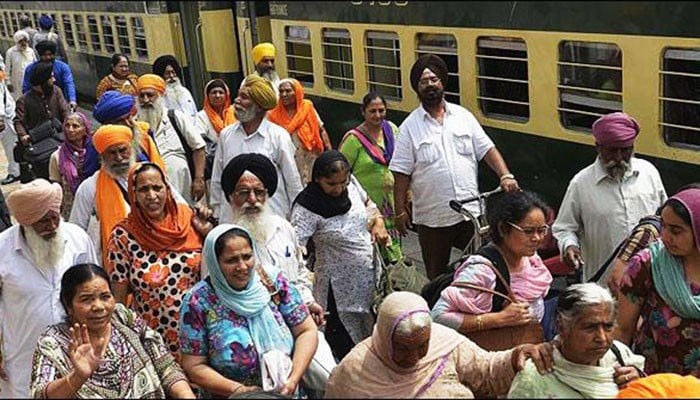Sikh (Yatrees)pilgrims, who had come to Pakistan from India for the Besakhi festival, started returning to their country Saturday.
According to officials, the first train left for India via the Wagah border with 650 Sikh pilgrims om board. A total of 1,730 pilgrims will return to India in three trains.
The Besakhi festival that the pilgrims had come to Pakistan for is a long established harvest festival in Punjab. As per BBC, Besakhi is one of the most important dates in the Sikh calendar. It is the Sikh New Year festival, which is celebrated on April 13 or 14, and also commemorates 1699, the year Sikhism was born as a collective faith.
This year, controversy erupted during the pilgrims’ visit when a press statement issued by the Ministry of External Affairs of India alleged that its high commissioner in Pakistan had been prevented from meeting Sikh pilgrims at Gurdwara Punjab Sahib in Hasan Abdal.
Pakistani Foreign Office Spokesperson Dr Mohammad Faisal said the Evacuee Trust Property Board had extended an invitation to the high commissioner of India to attend the main function of Besakhi at Gurdwara Punja Sahib. However, he said, ahead of the function the ETPB authorities noticed Sikh pilgrims protest the release in India of a film on Baba Guru Nanak Devji.
Fearing any untoward situation, Dr Faisal said the ETPB authorities contacted the Indian High Commission and suggested the cancellation of the high commissioner’s visit. The Indian High Commission officials agreed to the suggestion.
But the matter was raised with the Foreign Office in Islamabad and the Pakistan High Commission in New Delhi and a ''protest'' was lodged.
The Pakistani Foreign Office condemned the move in a statement, saying they regretted the Indian attempt to generate controversy around the visits of Sikh pilgrims and to vitiate the environment of bilateral relations.
"For decades, Pakistan has made excellent arrangements to facilitate the visits of Sikh yatrees from across the world, including India, and extended protocol, reception, security, medical and other facilities. This is consistent with our religious ethos and traditions of hospitality."
Tags:
festival



